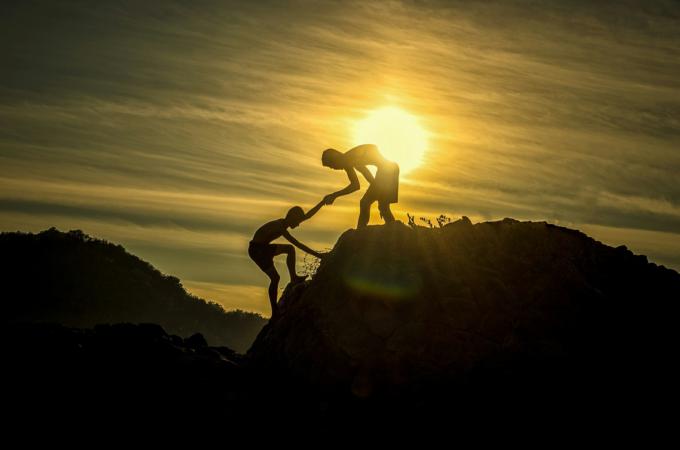But where are the others?
Most of us have been raised to believe that we have right to possess whatever comes to us honestly, either through our own work or through legitimate inheritance. No matter how large that wealth might be, it's ours, as long as we didn't cheat anyone along the way. By and large, this belief has been enshrined in the laws of our democratic countries and we generally believe that it is morally sanctioned by Christianity. That's partially true, but a lot needs to be nuanced here.
This is not really the view of our Christian scriptures, nor of the social teachings of the Catholic Church. Not everything we acquire honestly through our own hard work is simply ours to have. We're not islands and we don't walk through life alone, as if being solicitous for the welfare of others is something that's morally optional. The French poet and essayist, Charles Peguy, once suggested that when we come to the gates of heaven we will all be asked: "Mais ou sont les autres?" ("But where are the others?") That question issues forth both from our humanity and our faith. But what about the others? It's an illusion and a fault in our discipleship to think that everything we can possess by our own hard work is ours by right. To think this way is to live the partially examined life.
Bill Gates Sr., writing in Sojourners some fifteen years ago, challenges not only his famous son but the rest of us, too, with these words: "Society has an enormous claim upon the fortunes of the wealthy. This is rooted not only in most religious traditions, but also in an honest accounting of society's substantial investment in creating fertile ground for wealth-creation. Judaism, Christianity, and Islam all affirm the right of individual ownership and private property, but there are moral limits imposed on absolute private ownership of wealth and property. Each tradition affirms that we are not individuals alone but exist in community -- a community that makes claims on us. The notion that 'it is all mine' is a violation of these teachings and traditions." Society's claim on individual accumulated wealth "is rooted in the recognition of society's direct and indirect investment in the individual's success. In other words, we didn't get there on our own." (Sojourners, Jan-Feb., 2003)
Nobody gets there on his own and so, once there, he needs to recognize that what he has accumulated is the result not just of his own work but also of the infrastructure of the whole society within which he lives. Accordingly, what he has accumulated is not fully his, as if his own hard work alone had brought this about.
Beyond that, there's something else which Benjamin Hales calls "the veil of opulence" which lets us naively believe that each of us deserves everything we get. No so, says Hales. A lot of blind luck in involved in determining who gets to possess what: "The veil of opulence", he says, "insists that people imagine that resources and opportunities and talents are freely available to all, that such goods are widely abundant, that there is no element of randomness or chance that may negatively impact those who struggle to succeed but sadly fail through no fault of their own. ... It turns a blind eye to the adversity that some people, let's face it, are born into. By insisting that we consider public policy from the perspective of the most-advantaged, the veil of opulence obscures the vagaries of brute luck. But wait, you may be thinking, what of merit? What of all those who have labored and toiled and pulled themselves up by their bootstraps to make their lives better for themselves and their families? This is an important question indeed. Many people work hard for their money and deserve to keep what they earn. An answer is offered by both doctrines of fairness. The veil of opulence assumes that the playing field is level, that all gains are fairly gotten, that there is no cosmic adversity. In doing so, it is partial to the fortunate. ... It is an illusion of prosperity to believe that each of us deserves everything we get." (New York Times, August 12, 2012)
Scripture and the Catholic social teaching would summarize it this way: God intended the earth and everything in it for the sake of all human beings. Thus, in justice, created goods should flow fairly to all. All other rights are subordinated to this principle. We do have a right to private ownership and no one may ever deny us of this right but that right is subordinated to the common good, to the fact that goods are intended for everyone. Wealth and possessions must be understood as ours to steward rather than to possess absolutely. Finally, perhaps most challenging of all, no person may have surplus if others do not have the basic necessities.
In any accumulation of wealth and possessions we have to perennially face the question: "Mais ou sont les autres?"
- Oblate Father Ron Rolheiser, theologian, teacher, and award-winning author, is President of the Oblate School of Theology in San Antonio, TX. He can be contacted through his website www.ronrolheiser.com.
Now on Facebook www.facebook.com/ronrolheiser



















